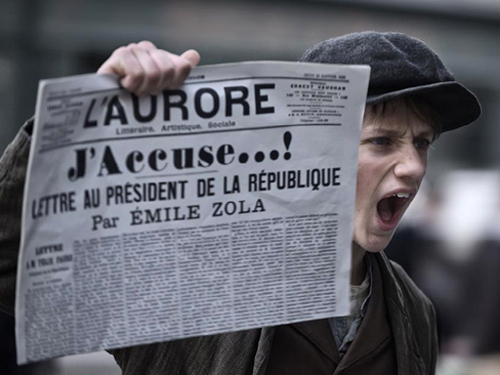
On January 5, 1895, Captain Alfred Dreyfus, a young promising officer of the French Army, is degraded for spying for Germany and is sentenced to life imprisonment on Devil’s Island in the Atlantic Ocean off French Guiana. Among the witnesses to his humiliation is Georges Picquart, who is promoted to run the military counter-intelligence unit that tracked him down. But when Picquart discovers that secrets are still being handed over to the Germans, he is drawn into a dangerous labyrinth of deceit and corruption that threatens not just his honour but his life.
“The film is about the Dreyfus Affair, a subject that has been on my mind for many years. In this vast scandal, probably the greatest of the late 19th century, judicial error, miscarriage of justice and anti-Semitism intertwine. During the twelve years it lasted, the Dreyfus Affair tore France apart, causing a genuine upheaval all over the world. It still stands as a symbol of the iniquity that political authorities are capable of in the name of national interest.”
Roman Polanski1
« L’accueil unanime et le Lion d'argent reçus par J'accuse à la Mostra de Venise ont déjà désamorcé les craintes. Il n'empêche. On ne découvre pas le "nouveau Polanski" sans une certaine appréhension, née d'une intuition contradictoire. D'un côté, on sait que le projet vient de loin, qu'il a mis plusieurs années à se monter et qu'il semble tout indiqué pour un cinéaste qui a fait de la persécution l'un de ses grands thèmes; de l'autre, on craint de voir surgir à l'écran des interférences entre l'affaire Dreyfus et l'affaire Polanski – ce qui heureusement pas le cas. »
Joachim Lepastier2
- 1Roman Polanski, “Biennale Cinema 2019 | J’accuse (An Officer And A Spy),”La Biennale di Venezia.
- 2Joachim Lepastier, “J’accuse de Roman Polanski. Feuilleton grinçant, ” Cahiers du Cinéma, 760 (2019), 49.

